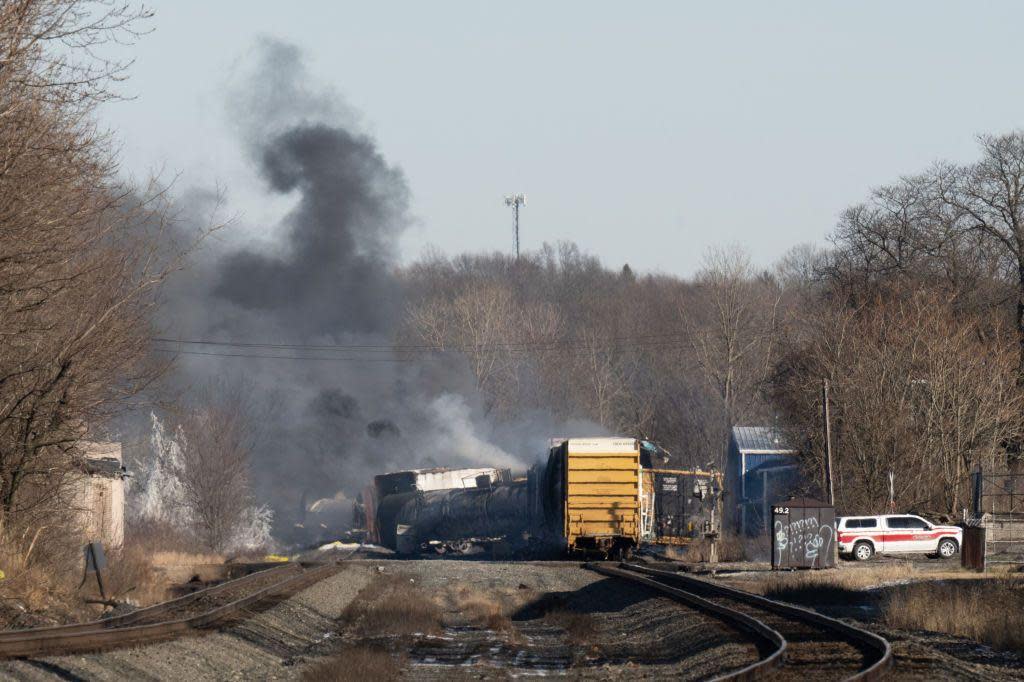Toxic burn after Ohio derailment unneeded, officials say

The burning of toxic chemicals after a rail disaster in East Palestine, Ohio - which sent hazardous smoke billowing into the air - may have been unnecessary, an investigation into the February 2023 train derailment found.
On Tuesday, the National Transportation Safety Board discussed a draft of a report about an incident that caused thousands of Ohioans to evacuate their homes last year and sparked fears of poisoned air and water.
Faulty equipment, flawed containers, and a lack of adequate training for emergency responders may have contributed to the accident, investigators said.
“To the people of East Palestine and the surrounding communities, we extend our deepest sympathies,” NTSB member Michael Graham said.
Federal transportation authorities have been investigating the derailment and its handling by Norfolk Southern, which drew national outrage, for more than a year.
The evening of 3 February 2023, a Norfolk Southern train derailed in East Palestine, Ohio. It was carrying goods like malt liquors and frozen vegetables - as well as about 11 cars worth of potentially toxic chemicals.
Several of the train cars caught fire, leading to immediate concerns about potentially volatile chemicals escaping.
A few days later, railroad officials decided to burn off one of the chemicals, vinyl chloride, due to fears it could explode. A photographer captured an image of a column of inky smoke rising over the town, which quickly became a symbol of the disaster and locked the nation’s attention on East Palestine.
Both President Joe Biden and former President Donald Trump visited East Palestine during the ongoing recovery effort last year.
Following the burn, officials told residents that the air was safe, but it only inflamed concerns among the local community that their town had been poisoned.
On Tuesday, officials said that burn may not have been necessary.
Norfolk Southern officials had believed the vinyl chloride could explode due to fears it had undergone a process called polymerization, the investigators said.
But the investigation found that Norfolk Southern had misinterpreted pressure data on the cars carrying the vinyl chloride, and that temperatures in those containers had declined.
“Vent and burn action was not necessary to prevent polymerization induced tank ruptures,” read a presentation of the panel’s findings.
The team recommended that the safety guidelines for vinyl chloride be modified, and for federal guidance on what circumstances would warrant use of such vent and burn procedures.
In a statement sent to the BBC, Norfolk Southern said that the "only motivation" in recommending the vent and burn "was the health and safety of the community and first responders".
The statement added that the company's specialist contractors believed it was "the only option" and that they "could not wait and see what happened" under the circumstances.
"The vent and burn effectively avoided a potential uncontrolled explosion," the statement added. "There was no loss of life, injuries, or damage to property, and contractors took steps to manage environmental impact."
In May, Norfolk Southern agreed to pay $310m (£243m) in a settlement with the government, and it reached a $600m settlement with East Palestine residents in April.
Last week, Norfolk Southern announced it would convene a "vent and burn workgroup" as part of its settlement with the US government.
Investigators also pinpointed other failures and weaknesses that contributed to the derailment itself.
They found that local firefighters and emergency responders did not have enough training to safely and properly combat the fire, and recommended enhanced training and resources.
The panel also found that Norfolk Southern did not notify first responders fast enough after the accident about the hazardous materials onboard, leading them to stay at the site longer than they should have immediately after the derailment.
Track and other infrastructure issues, train crew performance, and the marking of loading of train cars were among factors that did not contribute to the accident, investigators found.
In a lengthy response to the NTSB, Norfolk Southern said it "appreciates" the investigation and said that had already taken steps to address many of the safety concerns it identifies.
“We resolved not to wait for the NTSB’s final report before taking decisive action” said John Fleps, the firm's chief safety officer.
The company added that it will now compare the NTSB's recommendations to its own protocols to determine what further steps can be implemented.
The NTSB is now expected to release an executive summary of the report, with the final report to follow in the coming weeks.


